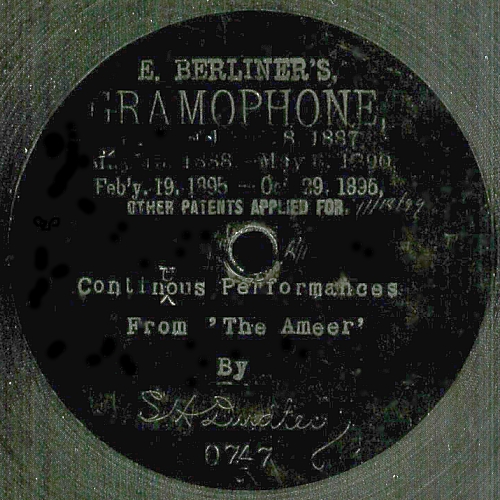

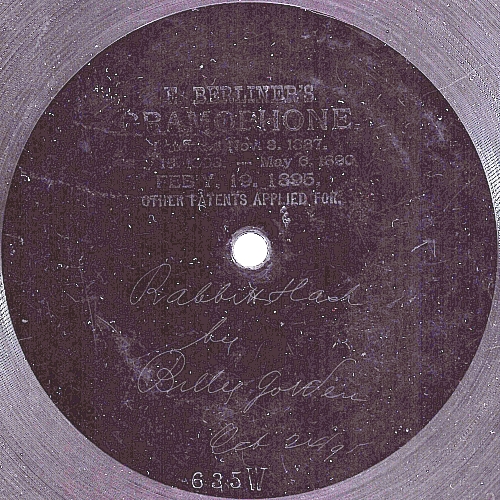 |
| Rabbit Hash |
| Billy Golden |
| Berliner 635W |
| Take 2 (of 4) |
| October 24, 1895 |
| Recording Location Unknown (New York, Philadelphia, or Washington D. C.) |
| Note: Standard 78RPM Stylus Version Here's a version played with a more basic stylus. The voice is a bit louder and more natural. Golden's laughs however can get quite loud and distorted, especially on such early records. This stylus gets pinched in the groove at those passages moreso than with the elliptical stylus used above. Standard 78RPM Stylus Version 2 Here's a similar stylus with a bit more surface noise but less distortion at the laughs. 4.0 Elliptical Stylus Non-Filtered Version This one uses a slightly wider stylus than the image-linked version. It picks up more surface noise too which then makes it sound very distorted when filtered. So, here it is non-filtered and non-EQed. |
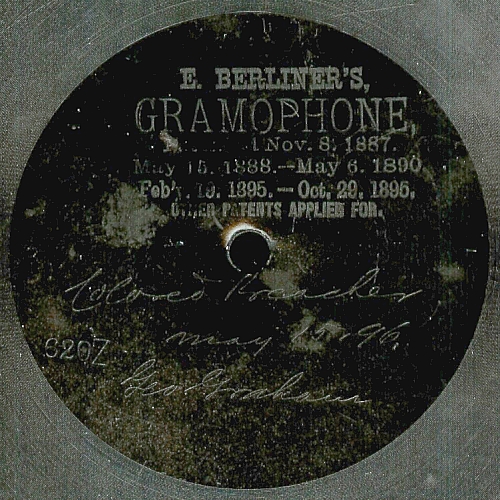 |
| Colored Preacher |
| George Graham |
| Berliner 620Z |
| Take 2 (of 3) |
| May 15, 1896 |
| Recording Location Unknown (New York, Philadelphia, or Washington D. C.) |
| Note: It's not your sound system. The record really does sound like this. Note the speed problem the engineer had at 0:44. It may also sound better (if you can call it that) without the final EQ: No-Equalization Version |
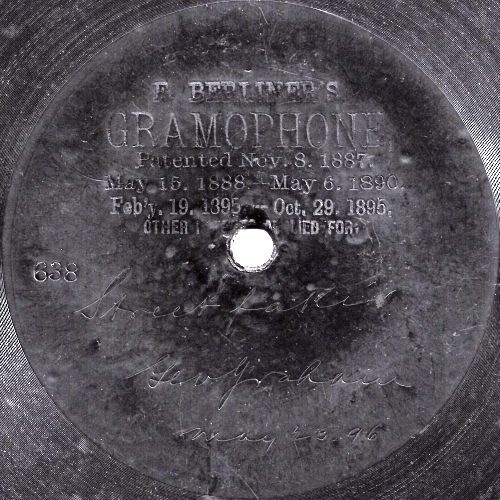 |
| Street Fakir |
| George Graham |
| Berliner 638 |
| Take Unknown |
| May 23, 1896 |
| Recording Location Unknown (but probably Washington D. C.) |
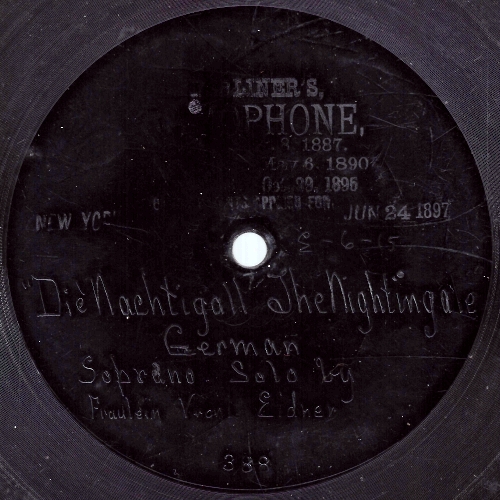 |
| Die Nachtigall |
| Vroni Eidner |
| Berliner 388 |
| Take 1? |
| June 24, 1897 |
| New York, New York |
| Note: Quote in the September 1897 issue of the National Gramophone Company's Record Catalog: "The reproduction of this record gives a high C clear and full, with no blast or rattle. Have you ever heard this note in a soprano record?" Something said in-studio before song starts? Softer/Weaker but More Natural Version |
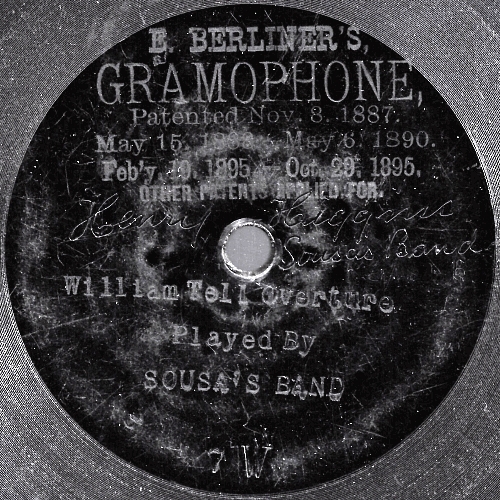 |
| William Tell Overture |
| Sousa's Band (Henry Higgins, conductor) |
| Berliner 7W |
| Take 1(W) of 3 |
| August 1897 |
| New York, New York |
| Note: Played at 75 RPM. |
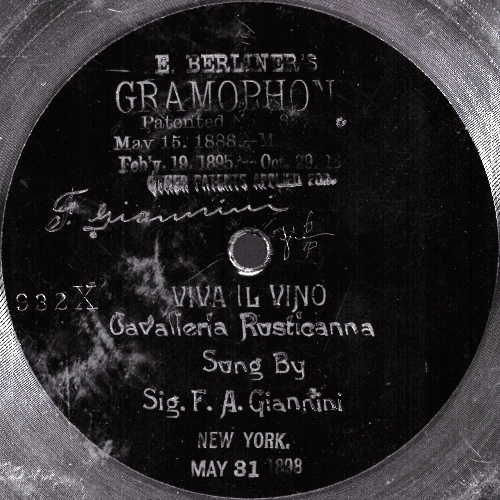 |
| Viva il Vino (Cavalleria Rusticanna) |
| Sig. Ferruccio A. Giannini |
| Berliner 932X |
| Take 3 (of 4) |
| May 31, 1898 |
| New York, New York |
| Note: Something said in-studio after the song? |
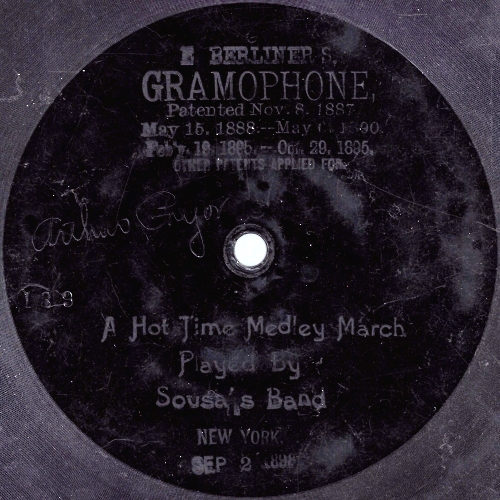 |
| A Hot Time Medley March |
| Sousa's Band |
| Berliner 139[a] |
| Take ? |
| September 2, 1898 |
| New York, New York |
| Note: No-Equalization Version Large bands were harder to record in this early period. This one may sound better. |
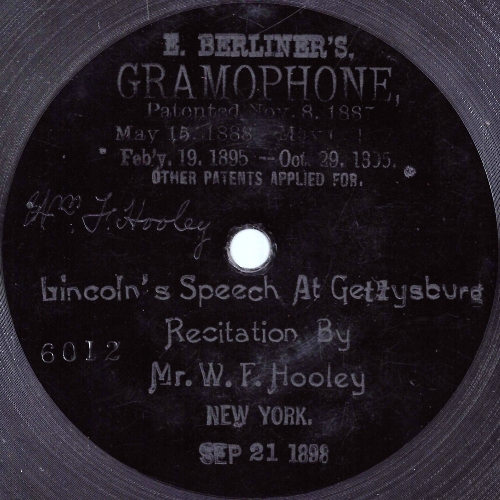 |
| Lincoln's Speech at Gettysburg |
| Mr. William F. Hooley |
| Berliner 6012 |
| Take ? |
| September 21, 1898 |
| New York, New York |
| Note: No-Equalization Version This one may sound better. 3.5 Elliptical Stylus Version The highs may be less distorted here but at the expense of overall brilliance. 3.5 Elliptical Stylus No-Equalization Version Even softer. |
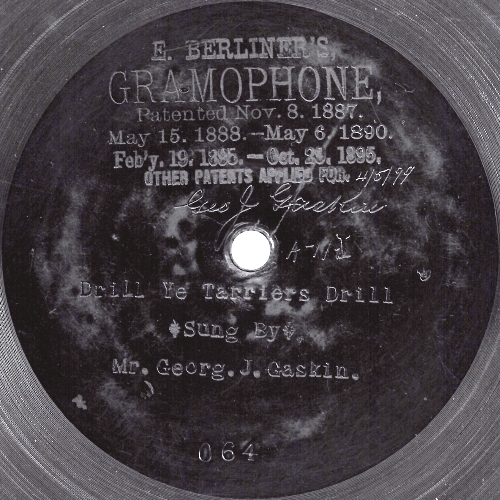 |
| Drill Ye Tarriers, Drill |
| Mr. George J. Gaskin |
| Berliner 064 (A-11-I) |
| Take Unknown |
| April 5, 1899 |
| Recording Location Unknown (NY or PA) |
| Note: Speed problems on master, especially at start. Listen to a (somewhat) corrected introduction here. |
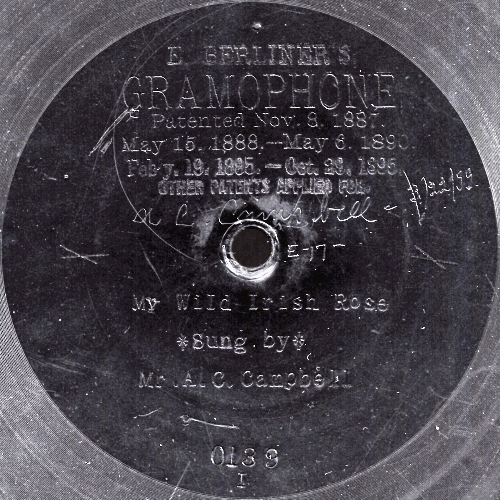 |
| My Wild Irish Rose |
| Mr. Albert C. Campbell |
| Berliner 0139 (I) (E-17-) |
| Take Unknown |
| March 22, 1899 |
| Recording Location Unknown (NY or PA) |
| Note: Worn with several skips corrected. |
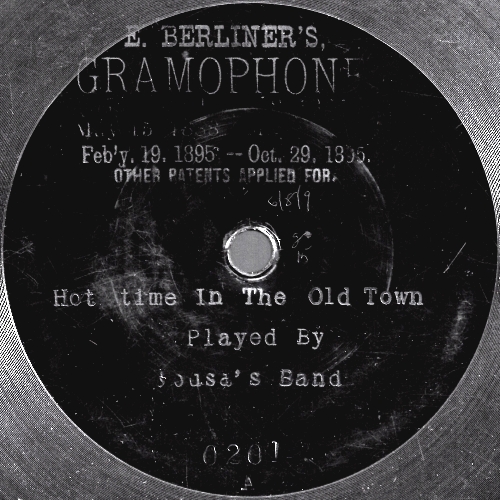 |
| Hot Time In The Old Town |
| Sousa's Band |
| Berliner 0201 (A) (g/15) |
| Take Unknown |
| June 8, 1899 |
| New York, New York |
| Note: Label stamped into final grooves but inaudible. Here's it played at 70 RPM, which may sound better. |
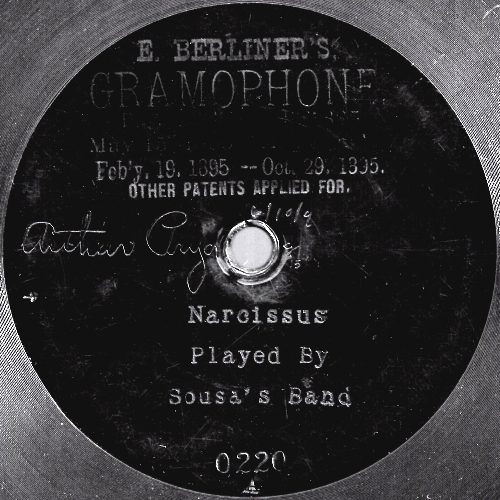 |
| Narcissus |
| Sousa's Band |
| Berliner 0220 (A) (g/15, �) |
| Take Unknown |
| June 10, 1899 |
| New York, New York |
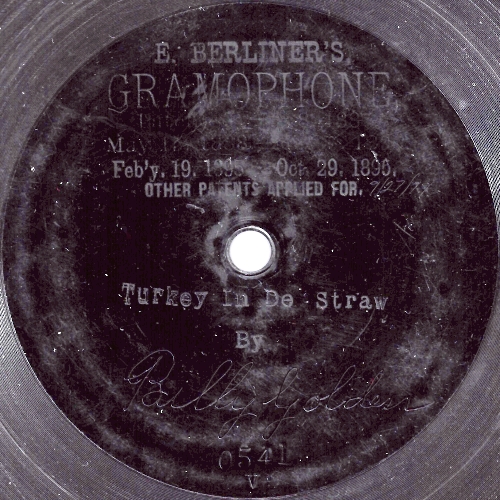 |
| Turkey in De Straw |
| Billy Golden |
| Berliner 0541 (V) (R/11) |
| Take Unknown |
| September 27, 1899 |
| Recording Location Unknown (NY or PA) |
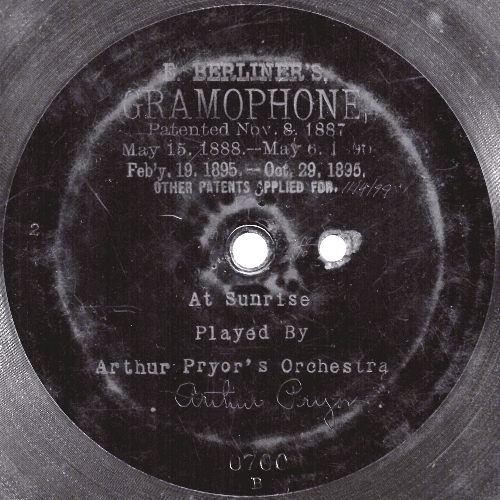 |
| At Sunrise |
| Arthur Pryor's Orchestra |
| Berliner 0700 (B) (P 10/10) |
| Take 2 |
| November 4, 1899 |
| Recording Location Unknown (NY or PA) |
| Note: One of five selections recorded by the Pryor Orchestra that day in its very first studio session. The first half of this disc is more worn than the second. Here's an overall softer version that may prove more pleasant but at the expense of some highs. Speed problem on master 0:27-0:28. After the song ends, there's also something spoken that has yet to be deciphered. |
 |
| Continuous Performances From 'The Ameer' |
| S. H. Dudley |
| Berliner 0747 |
| Take 1 (of 1) |
| November 18, 1899 |
| Recording Location Unknown (NY, PA, or DC) |
| Note the correction in spelling of the song title. |
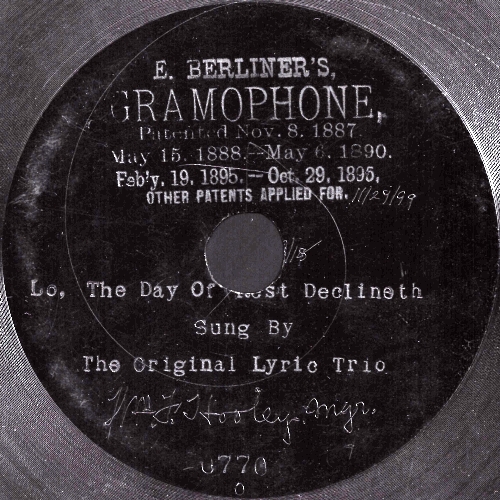 |
| Lo, The Day Of Rest Declineth |
| The Original Lyric Trio William F. Hooley, Mgr. |
| Berliner 0770 |
| Take Unknown |
| November 29, 1899 |
| Recording Location Unknown (NY or PA) |
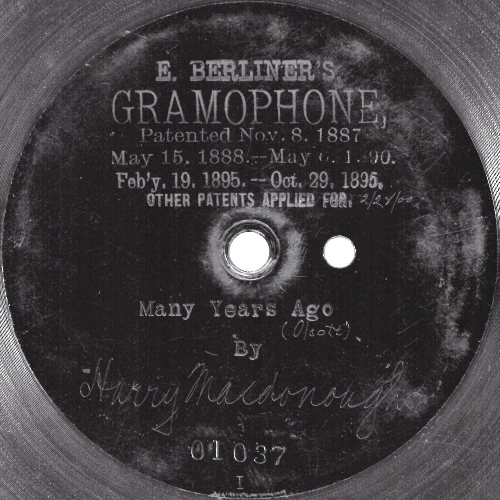 |
| Many Years Ago |
| Harry Macdonough |
| Berliner 01037 (I) |
| Take Unknown |
| February 28, 1900 |
| Recording Location Unknown (NY or PA) |